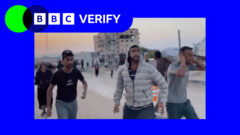Earlier, the Israeli Defense Forces (IDF) had not documented the strike near Khan Younis, and only after inquiries from BBC Verify did they acknowledge their involvement, attributing it to "technical and operational errors." The IDF claimed that artillery fired at a target deviated and mistakenly hit the civilian area. No concrete evidence was provided to support these claims. Notably, the IDF has rarely admitted to such errors since the conflict escalated in October 2023.
Footage gathered by BBC Verify depicted a devastating aftermath of the Khan Younis strike, showing bloodied bodies and chaos among displaced Palestinians, many of whom were residing in makeshift shelters. The Kuwaiti Field Hospital confirmed the casualties, affirming the serious nature of the incident.
Initially, the footage from the Khan Younis blast was wrongly linked to the killings at the Rafah aid site. However, thorough geolocation and verification efforts revealed the true location of the strike, leading BBC Verify to clarify the misunderstandings surrounding the two incidents. In the light of this, the IDF's statement regarding "warning shots" fired near the aid site raised further questions about the military's accountability in the ongoing conflict.
The fallout from this incident has attracted attention not only within Israeli military circles but also reached Washington, where misinterpretations of the BBC's report were addressed in a public statement by the organization. As the crisis in Gaza continues, with over 54,607 fatalities reported since the onset of violence, the need for accurate information and transparency remains essential amid the ongoing tragedy.
Footage gathered by BBC Verify depicted a devastating aftermath of the Khan Younis strike, showing bloodied bodies and chaos among displaced Palestinians, many of whom were residing in makeshift shelters. The Kuwaiti Field Hospital confirmed the casualties, affirming the serious nature of the incident.
Initially, the footage from the Khan Younis blast was wrongly linked to the killings at the Rafah aid site. However, thorough geolocation and verification efforts revealed the true location of the strike, leading BBC Verify to clarify the misunderstandings surrounding the two incidents. In the light of this, the IDF's statement regarding "warning shots" fired near the aid site raised further questions about the military's accountability in the ongoing conflict.
The fallout from this incident has attracted attention not only within Israeli military circles but also reached Washington, where misinterpretations of the BBC's report were addressed in a public statement by the organization. As the crisis in Gaza continues, with over 54,607 fatalities reported since the onset of violence, the need for accurate information and transparency remains essential amid the ongoing tragedy.





















